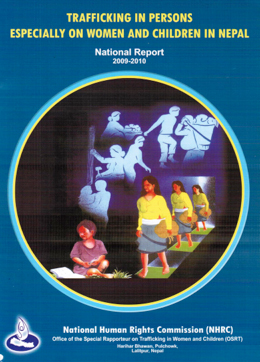
I’m writing this in Kathmandu, and yet again the question of parenting has been raised.
This time, it’s in the context of human trafficking. Trafficking is a problem in Nepal. The porous border with India, a destination for women and girls being trafficked into the sex trade, and the significant markets for child labour and exploitative labour in this whole subregion make trafficking a lucrative and relatively low risk business.
I met with the national rapporteur on human trafficking, as well as with a senior journalist who’s been following this topic for some time. The question they raised, as do many others around the world that I talk to about trafficking, is “how can parents just hand over their children to traffickers? Even if they don’t know the full horror story of what happens to trafficking victims, surely parents must hesitate to hand over their child to just be taken away to work?”
I wish I knew the answer. Despite what people think (and write sometimes), it isn’t about ‘poverty’’.
There are many poor people who would never consider exploiting their children for money. There are parents who trade their children even when they are coping financially. There must be something else that makes one parent protect a child at all costs while another just sees the child as a way of making money. I looked at this briefly in a paper I wrote on the impact of the Global Financial Crisis on child labour – you’ll find it in the ‘child labour’ section of the publications archive on this site. But ultimately it remains a mystery to me: it just seems that some human beings behave in ways that most of us would find inhuman…
Meanwhile, I thought I’d share with you another issue that has arisen during my time in Nepal. This doesn’t surprise me, although I was beginning to think I was something of a lone voice on this matter. The journalist I was talking to asked me what could be done about charitable organisations/not-for-profits that act in ways that are damaging to their so-called ‘beneficiaries’ and make a name for themselves as organs of goodwill at the same time. The example she gave was an interesting one: the Nepalese press has covered a number of stories of Nepalese women going to the Gulf States to work as domestic helpers being so badly treated that, in one case, a woman committed suicide. In something of a knee-jerk reaction, the government of Nepal has banned travel by women to the Gulf for work as domestics. But it’s a tempting opportunity for many women and so it has become common for Nepalese women intending to migrate for domestic labour to cross the land border into India and then make their way to the Gulf from there.
Now, it seems, a well-known not-for-profit is waiting at the border and pointing these women out to the border guards as ‘trafficking victims’. They are being intercepted and returned to Nepal. And the organisation is putting out press releases saying it has ‘saved’ yet another trafficking victim. This is cynical, despicable even, and totally in contravention of the women’s right to migrate legally.
This is not the only example I’ve seen of organisations doing harm in the guise of helping people. Sometimes it happens through ignorance, lack of information or understanding or sometimes just for the sake of a bit of publicity. It just proves, yet again, that everyone who wants to help stop trafficking must understand the issue before acting. People’s lives are at stake.
